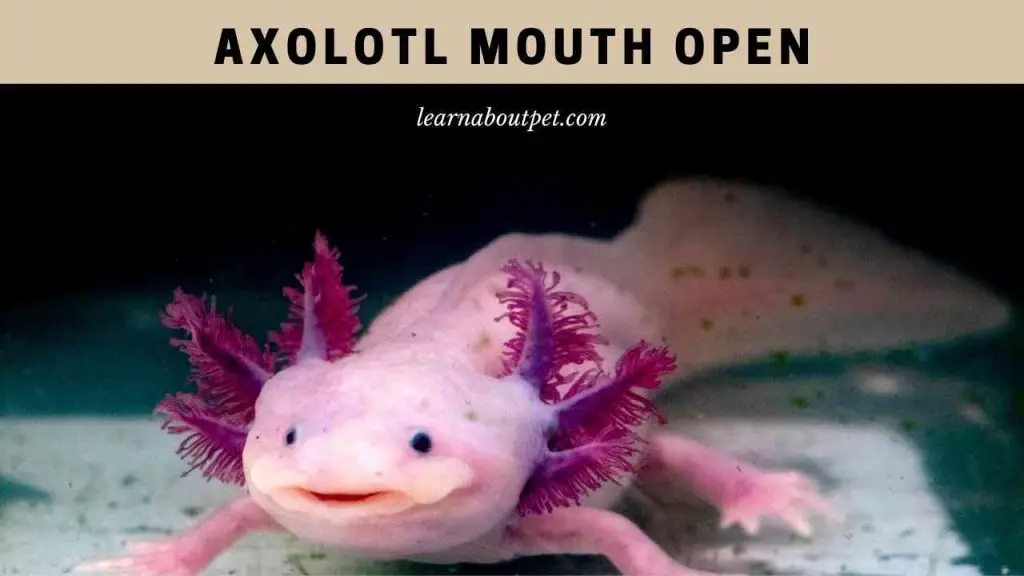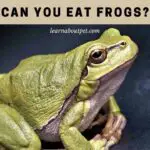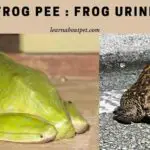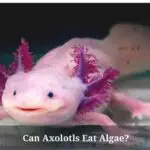It can be rather alarming to realize that your axolotl’s mouth is staying open. Once you make this realization, you will probably want to know what can make an axolotl’s mouth stay open, and what you can do about it. This article explores those issues.
Things that may keep an axolotl mouth open for extended periods of time include unhealed jaw injuries, impaction, metabolic bone disease and deformities. Fungal infections and poor water conditions too can cause this problem. In the worst case scenario, the axolotl with an open mouth may be dead or dying.
Therefore if you find your axolotls mouth open for long periods of time, these are the likely causes.

Note that our focus here is on cases where the axolotl’s mouth remains open for long periods of time. So the focus is not on, say, an axolotl yawn: where it opens the mouth, keeps it open for a short while, then closes it.
Our focus is on cases where the axolotl’s mouth remains open for long. Or where the axolotl seems to be unable to close its mouth.
Why Is My Axolotl Mouth Open?
There are seven key possibilities to consider, if you notice that your axolotl’s mouth is remaining open for long periods of time.
Firstly, the axolotl may have some jaw injuries. Axolotls often end up with jaw injuries due to eating things that don’t fit into their mouths well. And when an axolotl incurs jaw injuries that way, it may not be able to close its mouth for a while.
Therefore the mouth may remain open for a while.
Secondly, the axolotl may have some sort of impaction in its digestive system. This may be due to eating food that it can’t digest or swallowing pebbles.
An axolotl with that sort of impaction will often not be able to close its mouth. So the mouth remains open.
Thirdly, the axolotl may be having a condition we refer to as metabolic bone disease. This often makes it impossible for axolotls to close their mouths. Consequently, the mouths remain open.
Fourthly, the axolotl may be having fungal infections. These sometimes cause the axolotl’s mouths to remain open.
Fifthly, the axolotl may be in very poor water conditions. For instance, ammonia levels in the tank may be too high. Axolotls in such conditions often end up with their mouths open all the time, due to stress.
Sixthly, it may be due to an inborn deformity that an axolotl has a mouth that is open all times.
And seventhly, the axolotl whose mouth is open may be dead or dying. When axolotls die, their muscles stiffen, often to a point of leaving their mouths agape.
Therefore if the axolotl mouth is wide open, and the axolotl has other signs of being dead (like not being responsive to touch, floating and starting to rot), then it may indeed be dead.
Why Does My Axolotl Keep Opening His Mouth?
It may be a case where the axolotl has some sort of jaw injury. On account of this injury, he is unable to keep his mouth shut for long. So he keeps opening it.
It could also be a case of impaction, which makes the axolotl keep on opening his mouth.
Another thing that can make your axolotl keep opening his mouth is the stress that comes as a result of being in poor water conditions.
Fungal infections too, can cause an axolotl to keep opening his mouth. So he tries to shut it, but it is as if something forces him to keep on opening it.
Note that what is under focus here is not a case where we have an axolotl mouth open all the time.
Instead, what we are focusing on in this section is a case where the axolotl is seemingly trying to keep the mouth shut. But he seems to be unable to do so, and therefore keeps on opening it.
Why Is My Axolotl Opening And Closing Mouth?
A case where you find an Axolotl opening and closing mouth many times can be very intriguing.
Now if an axolotl keeps opening and closing mouth, there may be something stuck at the back of the mouth. For instance, if an axolotl tries eating a pebble, it may stick at the back of the mouth.
An Axolotl opening and closing mouth may also be due to impaction. So it may have tried to eat something it can’t digest, leading to impaction, the effects of which make it keep on opening and closing its mouth.
But what if it is a situation where the axolotl keeps opening its mouth, having it open for long (hours) but then managing to close it at some point?
This may be due to developing metabolic bone disease, due to a fungal infection or being in very poor water conditions.
It can also be a result of jaw injury: though, in most cases, axolotls with jaw injuries are unable to close their mouths at all. But if the injury is slight or starting to heal, the axolotl may manage to close the mouth at some points.
So it would fall into a pattern of opening and closing the mouth.
Why Is My Axolotl Mouth Open Not Moving?
An axolotl mouth open not moving may be due to a bad jaw injury.
Advanced metabolic bone disease may also cause an axolotl mouth to remain open, and hard to close/move.
Then again, this may be a situation where you are looking at an axolotl dead mouth open. Axolotls usually die with open mouths. And due to muscle stiffening, such mouths often prove hard to close/move.
Therefore if the axolotl has other signs of lifelessness, this too is a possibility. If it happens to be the case, you would have to move from trying to figure out why the axolotl’s mouth is open, to figuring out, why did my axolotl die?
All in all, any situation where you have an axolotl mouth open not moving at all is quite serious. It is as serious as a jaw-lock situation: where axolotl can’t open mouth at all.
Why Is My Axolotl Sitting With Mouth Open?
Where you have an axolotl sitting with mouth open, it may be due to the axolotl being in very poor water conditions. For instance, a tank that is full of ammonia may cause an axolotl to sit with its mouth open.
Another thing that is capable of causing an axolotl to sit with mouth open is jaw injury. A jaw injury can make it hard for the axolotl to close the mouth: forcing it to sit at the bottom of the tank with the mouth open.
Metabolic bone disease too has potential to make an axolotl sit with mouth open.
And there are some fungal infections as well that have this effect: of making an axolotl to sit with mouth open.
There is one key thing to appreciate here: that any situation where your axolotl sits with mouth open for long periods of time isn’t normal.
Sure, it may look like a cute axolotl mouth open scene. You may even be tempted to create an axolotl open mouth meme out of it, if you have some artistic talent.
But it could be a sign of something that is very wrong with the axie.
In fact, any weird mouth open axolotl behavior calls for special attention.

Why Is My Axolotl Mouth Slightly Open?
There are two key possibilities here.
Firstly, it may be due to a jaw injury. A minor/healing jaw injury won’t cause your axolotl’s mouth to remain wide/fully open all the time. But it may cause the axolotl’s mouth to remain slightly open.
The second possibility is that of fungal infections. Most fungal infections may not cause your axolotl’s mouth to remain wide/fully open. But they may cause the axolotl’s mouth to remain slightly open.
Of course, other explanations are possible.
Where you have an axolotl mouth that is always slightly open, it may be due to a deformity.
Impaction, in some axolotls, can cause the mouths to remain slightly open.
And metabolic bone disease that is still in its early stages may cause an axolotl to have a mouth that is always slightly open.
There are even those who attribute this slight mouth opening to gasping for air. So they refer to it as ‘axolotl slightly gaping mouth’ and proceed to ask, why is my axolotl gasping?
Under the circumstances, others even go as far as asking: is it normal for axolotl to gulp air?
But in actual fact, it would only be genuine ‘gulping for air’ if the axolotl comes to the top of the tank, opens the mouth and makes the characteristic burping sound.
If it is happening under water, it is hard to see how we would refer to it as genuine gulping for air…
Do Axolotls Die With Mouths Open?
Someone who discovers their axolotl mouth open may start fearing the worst: that the axolotl is dead. This is especially so if the axolotl with an open mouth also looks lifeless.
That is what may lead to this question, on whether axolotls die with their mouths open.
And the answer is ‘yes’. Axolotls typically die with their mouths open. The muscle stiffening that occurs when axolotls die is apparently what causes the mouths to stay open.
But not every case of an axolotl mouth open is indicative of death.
You have to look for and confirm other signs of being dead, before you can start thinking that the open mouth means that the axolotl is dead.
And even if it looks lifeless, you need to know that it may only be asleep.
That is what may cause someone under these circumstances to ask, how do I know if my axolotl is sleeping or dead?
You need to understand that even in the video games context, not every instance of an apparently lifeless axolotl with an open mouth actually means it is dead.
In fact, in minecraft axolotl open mouth is rarely, by itself, indicative that an axolotl is dead.
All in all though, if an axolotl has its mouth wide open, and it is stiff, floating and maybe starting to rot, then it may actually be dead.
Axolotl Mouth Open – What To Do?
The first step is to find out why the axolotl’s mouth is staying open.
Is it due to a fungal infection? Could it be due to impaction? Or could it be because of developing metabolic bone disease?
Is it on account of jaw injury or deforming? And could it be due to the axolotl being in poor water conditions?
Just find the underlying reason.
The general condition of the axolotl may be useful here. For instance, a case where you have an axolotl lethargic and mouth open would be very different from another one in which there is no lethargy.
Where there is lethargy, it may be due to some sort of infection, or being in poor water conditions. Where there is no lethargy, it may be due to something like jaw injury.
Also how long the problem has persisted can be helpful. If it is something the axolotl has since birth, it may be a deformity. But if it has a sudden onset, it could be due to impaction, infection or jaw injury.
Now after figuring out the reason behind the problem, you can take the appropriate corrective measures.
Possible Corrective Measures For Axolotl Mouth Open
Where it is due to impaction, fridging may be a useful strategy. But if it persists, it may be best to consult a vet, as some situations may require surgical intervention.
In a case where it is due to jaw injury, you may just bid your time till it heals. You can use fridging to promote faster healing. Or you may decide to just take the axie to a vet.
Where it is due to a fungal infection, an axolotl salt bath or fridging may be useful. If this doesn’t work, it is best to consult a vet.
And where it is due to a disease like metabolic bone syndrome, it is best to just get advice from a vet.
Where it is due to poor water conditions, you may need to change the water in the tank. Then develop a program through which you ensure good tank conditions consistently.
If the axolotl mouth open situation is due to a deformity, you may just have to live with it. Or you may consult a vet, to see if there is some viable surgical intervention.
Final Verdict – Axolotl Mouth Open
Axolotl mouth open may be due to jaw injury, impaction, fungal infection or developing metabolic bone disease.
It can also be due to the axolotl being in poor water conditions. And it can be due to an inborn deformity as well.
At worst, the axolotl with a mouth that is wide open may actually be dead (especially if it also has other signs of being lifeless).

Once you identify the reason why your axolotl’s mouth is remaining open, you can take the appropriate corrective measures.
If your corrective measures don’t seem to bring change, it is best to seek a vet’s advice urgently.
As a pet lover, make sure to learn about pet more and give your pet axolotl a good and comfortable life!

Welcome to Learn About Pet. My name is Rajkumar Ravichandran and I love all pets, travel, and amazing food. I write about my passion and personal experience caring for multiple pets in this blog! ❤️
Post Disclaimer
DISCLAIMER: THIS BLOG OR WEBSITE, "Learn About Pet", DOES NOT PROVIDE YOU WITH MEDICAL ADVICE AND IS NOT A SUBSTITUTE FOR MEDICAL ADVICE. ALWAYS GET IN TOUCH WITH YOUR PERSONAL VETERINARIAN AND USE INFORMATION HERE AS GENERAL ADVICE.
The information, including but not limited to, text, graphics, images and other material contained on this website are for informational purposes only. No material on this site is intended to be a substitute for professional veterinary advice, food recommendation, diagnosis, or treatment. Always seek the advice of your veterinarian or other qualified health care provider with any questions you may have regarding a medical condition or for pet food related questions.







